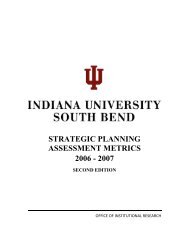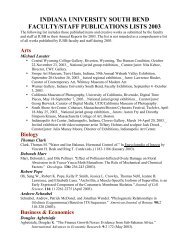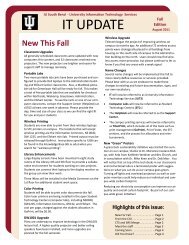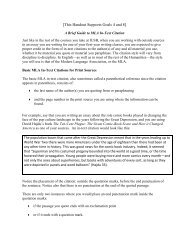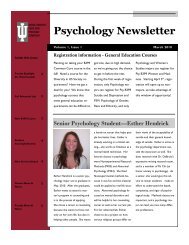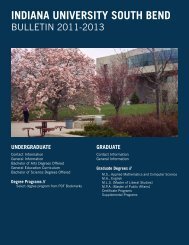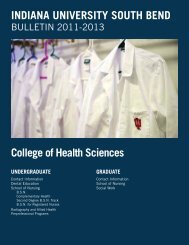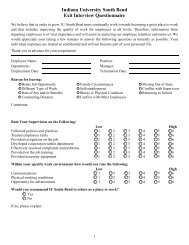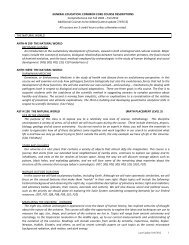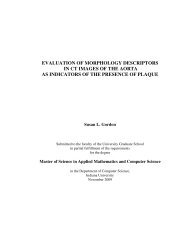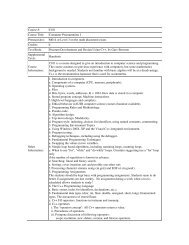Current version - Indiana University South Bend
Current version - Indiana University South Bend
Current version - Indiana University South Bend
Create successful ePaper yourself
Turn your PDF publications into a flip-book with our unique Google optimized e-Paper software.
3503 IU SOUTH BEND COURSE DESCRIPTIONS<br />
LSTU-L 190<br />
LSTU-l 199<br />
LSTU-L 200<br />
LSTU-L 201<br />
LSTU-L 203<br />
LSTU-L 205<br />
labor studies degree (1 cr.)<br />
Required for all DLS majors. This course will<br />
provide an introduction to the Labor Studies<br />
degree and to the knowledge and skills<br />
needed by students to progress toward a<br />
degree in a reasonable time frame. Students<br />
will learn how to build a plan of study that<br />
takes advantage of both credit for prior<br />
learning and new learning opportunities.<br />
Portfolio Development Workshop (1 cr.)<br />
Emphasis on developing learning<br />
portfolios as foundation documents for<br />
academic self-assessment and planning<br />
and as applications for self-acquired<br />
competency (SAC) credit. Applies only as<br />
elective credit to labor studies degrees.<br />
Survey of Employment Law (3 cr.)<br />
Statutes and common law actions protecting<br />
income, working conditions, and rights of<br />
workers. Topics include workers’ compensation,<br />
unemployment compensation, fair labor<br />
standards, Social Security, retirement income<br />
protection, privacy and other rights.<br />
LABOR LAW (3 cr.)<br />
A survey of the law governing labor<br />
management relations. Topics include the<br />
legal framework of collective bargaining,<br />
problems in the administration and<br />
enforcement of agreements, protection of<br />
individual employee rights.<br />
LABOR AND THE POLITICAL SYSTEM (3 cr.)<br />
Federal, state, and local governmental<br />
effects on workers, unions, and labormanagement<br />
relations; political goals;<br />
influences on union choices of strategies<br />
and modes of political participation,<br />
past and present; relationships with<br />
community and other groups.<br />
CONTEMPORARY LABOR PROBLEMS (3 cr.)<br />
An examination of some of the major<br />
problems confronting society, workers,<br />
and the labor movement. Topics may<br />
include automation, unemployment,<br />
international trade and conglomerates;<br />
environmental problems, minority and<br />
women’s rights; community relations;<br />
changing government policies.<br />
LSTU-L 220<br />
LSTU-L 230<br />
LSTU-L 240<br />
LSTU-L 250<br />
LSTU-L 251<br />
LSTU-L 255<br />
GRIEVANCE REPRESENTATION (3 cr.)<br />
Union representation in the workplace.<br />
The use of grievance procedures to address<br />
problems and administer the collective<br />
bargaining agreement. Identification, research,<br />
presentation, and writing of grievance cases.<br />
Analysis of relevant labor law and the logic<br />
applied by arbitrators to grievance decisions.<br />
LABOR AND THE ECONOMY (3 cr.)<br />
Analysis of the political economy of labor<br />
and the role of organized labor within it.<br />
Emphasis on the effect on workers, unions,<br />
and collective bargaining of unemployment,<br />
investment policy, and changes in technology<br />
and corporate structure. Patterns of union<br />
political and bargaining response. Fulfills<br />
economics requirement.<br />
OCCUPATIONAL HEALTH AND SAFETY (3 cr.)<br />
Elements and issues of occupational<br />
health and safety. Emphasis on the union’s<br />
role in the implementation of workplace<br />
health and safety programs, worker<br />
and union rights, hazard recognition<br />
techniques, and negotiated and statutory<br />
remedies—in particular the Occupational<br />
Safety and Health Act of 1970.<br />
Collective Bargaining (3 cr.)<br />
The development and organization of collective<br />
bargaining in the United States. Union<br />
preparation for negotiations; bargaining<br />
patterns and practices, strategy and tactics;<br />
economic and legal considerations.<br />
Collective Bargaining Laboratory<br />
(1-3 cr.)<br />
Designed to provide collective bargaining<br />
simulations and other participatory<br />
experiences in conjunction with LSTU-L<br />
250. Student must be currently enrolled<br />
in or have taken LSTU-L 250.<br />
Unions in State and Local<br />
Government (3 cr.)<br />
Union organization and representation<br />
of state and municipal government<br />
employees, including patterns in union<br />
structure, collective bargaining, grievance<br />
representation, and applicable law.<br />
LSTU-L 210<br />
Workplace Discrimination and Fair<br />
Employment (3 cr.)<br />
Examines policies and practices which<br />
contribute to workplace discrimination<br />
and those designed to eliminate<br />
discrimination. Explores effects of<br />
job discrimination and occupational<br />
segregation. Analyzes Title VII, American<br />
Disabilities Act, and related topics<br />
in relation to broader strategies for<br />
addressing discrimination.<br />
P = Prerequisite, R = Recommended, C = Concomitant, VT = Variable Title<br />
I = fall semester, II = spring semester, S = summer session(s)<br />
LSTU-L 260<br />
Leadership and Representation (3 cr.)<br />
Organizational leadership issues for<br />
union, community, and other advocate<br />
organizations. Analyzes leadership<br />
styles, membership recruitment and<br />
leadership development. Examines the<br />
role of leaders in internal governance<br />
and external affairs including committee<br />
building, delegation, negotiations, and<br />
coalition building.



